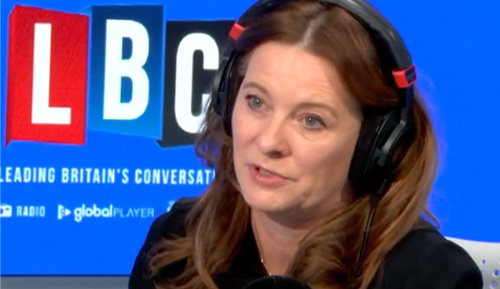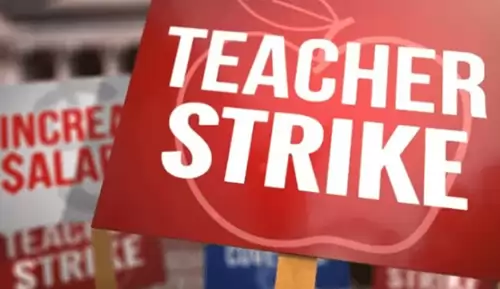Education Secretary insists teachers are in the top 10% of earners amid fears of a strike
Four of the biggest teaching unions in England - NASUWT, the NEU and NAHT are balloting members on strike action, whilst the ASCL launched the first consultative ballot on strike action in its history over pay and funding, despite the government providing an extra £4.6 billion of funding and increasing teachers’ salaries by an average of 5%: the highest rise for public sector workers.
Results from the ballots are expected this month (voting closes 13 January). For the strike to go ahead, it needs a 50% turnout rate, with 40% of eligible staff backing strikes to call a walkout. If teachers vote to strike, they will join paramedics, nurses, postal and rail workers, as well as Border Force staff, who are all walking out this month.
With Scotland already planning strikes, which are set to take place on 10 January for Primary school teachers, followed by Secondary teachers, who will walk out on 11 January.
Mike Corbett, NASUWT national official Scotland, said: "Teaching is a critical job and one that is uniquely and increasingly challenging.”
"Teachers just want pay levels that reflect the years of training they have undertaken, the high level of workload involved and the skills involved in meeting the needs of all pupils.”
"They want salaries that enable experienced teachers to remain in the profession long-term and which will incentivise new entrants to join teaching.”
"They want pay levels that demonstrate they are respected and valued as the key workers they are."
“I hope teachers do not vote to strike, but that is their right.”


Last month Education Secretary Gillian Keegan spoke to LBC radio saying “I hope teachers do not vote to strike, but that is their right. What we are trying to do is make sure we do not bake in inflation.”
“If we can stabilise the economy we will be seeing inflation coming down next year. It’s really serious because you cannot spend your way out of it; you will end up with spiralling inflation and if you spend extra money it will just be eaten up by rent and other things.”
When asked why teachers were leaving the profession, Ms Keegan said the “pandemic has had a massive impact on education”.
“They’re doing a lot to catch up. And it has, you know, it’s been a tough environment,” she added.
Dr Patrick Roach, NASUWT general secretary, said: "We have been left with no choice.”
"At a time when teachers are facing the biggest squeeze on their finances in a generation, offering what amounts to a further real-terms pay cut is simply not good enough.”
"Our members are not prepared to stand by while their pay dwindles and their living costs rise.”
"The Government and employers will need to bring forward a substantially improved pay offer if they want to see an end to this dispute."
Are teachers really in the top 10% of earners?
Ms Keegan told listeners, “My cousin has just started teaching and she is on £28,000. She is 23 and lives in Knowsley (Merseyside). She is single and lives with her mum and dad, but the reality is that she is in a good career, it’s probably within the top 10% of earners in some parts of the country.”
According to October 2022 estimates from the Office for National Statistics (ONS), a full-time employee would have to earn a monthly salary of at least £5,090, to be in the top 10% of earners across the country.
This would be more than £61,000 a year. It means that 90% of full-time employees nationwide earn less than this amount.
The starting salary mentioned in the interview - £28,000 - is roughly half of that figure. The average classroom teacher's salary of about £39,000 would also fall way short of the top 10%.
But Ms Keegan said "some parts of the country". The ONS figures show that - where the data is available for larger local authorities - there is no area in England in where the minimum salary to get you into the top 10% of earners is less than £53,840.
Ms Keegan also told LBC that head teachers earned an average salary of £95,000. This figure is much higher than the salary reported by official DfE statistics. In 2021, the average head teacher salary in England was £74,100.
Speaking to Channel 4 on 22 December, Ms Keegan clarified the £95,000 figure referred to secondary school head teachers, which would be accurate.
The highest teaching salaries across the UK are paid to headteachers, but even then, most are not in the top 10% of earners.
Facing questions from teachers and parents, she said the Government had agreed to union demands to increase funding for schools but was told it was not enough and that conditions also had to change. She said: “We have raised the starting salary because of the need to attract graduates - £28,000 for someone starting straight from uni and that will be £30,000 by 2024.”
But she was told it was not enough, and that working conditions also had to change.
One teacher from Bromley, Kent, told her: "The fact that teachers are one of the higher paid public servants in this country, as a low-wage economy, I think that is something more shameful than something to celebrate.
"I know how far my wages go each month, I know many people who have second and third jobs because they cannot make ends meet.”
Responding to the interview, shadow education secretary Bridget Phillipson said that Ms Keegan's comments show that she is "complacent about the teacher-recruitment and retention crisis happening in our schools".
“Teachers are leaving the profession in droves because they are overworked and underappreciated by this Conservative government, while potential new recruits are turning away from a career in our classrooms.”
Ms Phillipson added that a Labour government would “boost working conditions for our teaching workforce by recruiting 6,500 more teachers, paid for by ending tax breaks for private schools”.
Kevin Courtney, joint general secretary of the National Education Union, said: “I am glad that the Education Secretary was able to hear the first-hand experience of teachers and what is driving members to vote "yes" in the NEU ballot on pay.”
“A recent report from Public First shows that teachers have been amongst the worst affected by a "lost decade" of pay growth since 2010 - and this is making recruitment difficult.”
“We need a fundamental rethink by the government on how they treat teachers and support staff, as well as schools. This should start by accepting that the real-terms cuts to pay have gone on for long enough.”
“Right now, it is the Government's intransigence which is driving a deepening recruitment and retention crisis. It needs to be taken seriously, not dismissed by Gillian Keegan, as it is not going away.”






